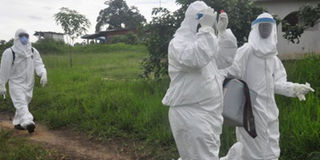Rukwa residents cautioned on Ebola

What you need to know:
- The move comes after some people in the neighboring country of the Democratic Republic of Congo (DRC) were discovered recently to be suffering from the deadly disease.
- The Rukwa Regional Commissioner, Mr Zelothe Steven Zelothe, gave the precaution to the residents shortly after opening a meeting with councilors.
- The meeting, which took place in the region, aimed at improving revenue collections through the councilors’ inspiration.
Sumbawanga. The Rukwa Regional Government leadership has cautioned its residents, particularly those living in border areas, about the Ebola disease outbreak.
The move comes after some people in the neighboring country of the Democratic Republic of Congo (DRC) were discovered recently to be suffering from the deadly disease.
The Rukwa Regional Commissioner, Mr Zelothe Steven Zelothe, gave the precaution to the residents shortly after opening a meeting with councilors.
The meeting, which took place in the region, aimed at improving revenue collections through the councilors’ inspiration.
He said the disease outbreak had been announced to have occurred in the DRC, calling on the residents of Rukwa Region to take highly precautionary measures, especially when receiving foreigners from the DRC and other neighboring countries.
The region’s Acting Chief Medical Officer, Dr Emmanuel Mtika, said the information they had indicated that out nine persons suspected of contracting Ebola, three were diagnosed with the deadly disease.
He elaborated that Ebola was spread through the contamination of fluid from a patient and carcasses, whereby, he said, its symptoms would be felt after two days since the patient contracted the disease.
According to Dr Mtika, the symptoms will include bleeding through the body’s openings like the nose, ear and suffering from severe fever.
However, he said already health committees in all the districts of the region had been tasked to provide education to the residents, especially in the border areas, where there were massive interactions of people, especially from the DRC.
Dr Mtika added that the residents were supposed to give information to health experts once they discovered that a foreigner had entered the country and suspected that such a person had the symptoms of the disease.
He also advised the residents not to take part in the funeral of a person died of the disease.



